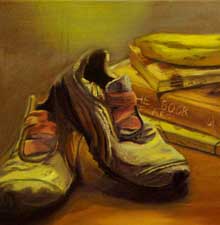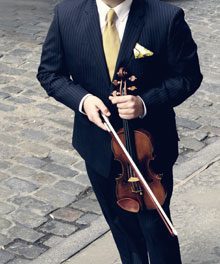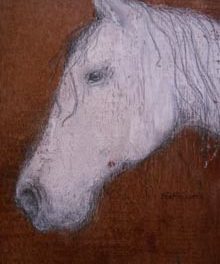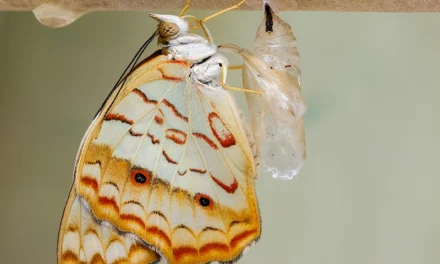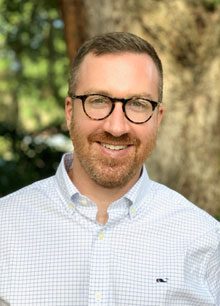 Ryan Copeland’s new memoir chronicles the weird life of a
Ryan Copeland’s new memoir chronicles the weird life of a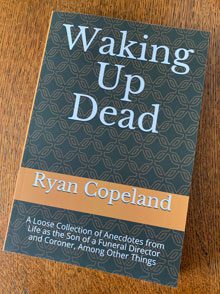 funeral director’s son.
funeral director’s son.
If you’ve ever met anyone who grew up in the funeral industry, you’ll know that they’re weird. Author/columnist Ryan Copeland, the son of Beaufort’s longtime coroner/funeral director, the late Curt Copeland, reflects on his unusual upbringing in his new memoir Waking Up Dead. For this issue of Lowcountry Weekly, Ryan interviewed himself. (We told you these people are weird.)
May I start by asking why you chose to interview yourself?
Yes, you may start that way.
It’s just an odd format.
Everything I do is odd, have you not read my book, Waking Up Dead?
Yes, let’s talk about that for a moment. Why this book, why now?
It’s something that’s always stirred inside of me. People have come up to me for what’s felt like generations now to ask why I’m not in the funeral business like my dad. That’s those who don’t start by asking if I’m related to my dad because they’d never heard of me. I have a million stories from growing up in this town with everyone knowing my dad and few knowing me because we were so different in personality. I just considered my stories somewhat unique. The curiosity of people around me were always piqued when I related what my dad did for a living as a funeral director and county coroner, so I thought I’d compile the stories from my perspective and share.
That’s nice and all, but why now?
My dad passed away ten years ago and it finally seems safe to talk about some of this. But also, we’re in the middle of a pandemic and I had nothing else to do. If I were smart I’d have used the time to work on inventing a new medication, or writing a software program or basically anything useful to humanity. Writing, though, is the only thing that’s ever come naturally to me. That, and throwing a baseball, but who wants to sit around and watch me throw baseballs to myself?
Is that why you self-published instead of going through the traditional route?
Look, self-publishing (rightly) has a stigma attached to it, but I promise you this was the quickest and easiest way to get this done during federal, state and local quarantine. I also had an editor graciously comb through and I can assure you this isn’t a dime-store novel. It’s also not going to end up at a yard sale. Yet.
What kind of audience are you hoping to capture for this book?
Obviously anyone in Beaufort who knew my dad could read the book and understand my perspective. Unlike me, my dad seemed to generate a strong reaction in people. He was always in the public eye and people seemed to really love him or…a different reaction. Aside from the public, however, he was a normal guy with a family and none of his six grandchildren remember a ton about him, so I wrote some of the stories down for them. I think it also speaks maybe to a larger audience about how parents and children relate to each other when they’re so different. Maybe some fans of true crime and non-fiction will also enjoy. Basically, I asked myself what type of book I’d like to read, and this was it. This is not War and Peacebut it’s not exactly summer beach reading either. It’s hopefully something with a little for everyone.
Yes, you’ve described yourself before as both “exceptionally average” and “radically moderate.” Your dad, meanwhile, was a larger than life character.
Is there a question there?
No, I’m just pointing out that you are not unique.
My stories are, I think. I’d never make a comparison to Frank McCourt in Angela’s Ashes, but that’s maybe the best modern memoir available, and the story of an Irish immigrant who becomes a teacher grabs your attention because of the writing of the author. My story is not heartbreaking and I’m not profound like McCourt, but I tried to cross the sensitive nature of my topic with lightheartedness.
Let’s talk about that – you know death is a serious topic.
It is, but when you’re around it a lot the normal human emotions become more and more difficult to tamp down. No one can live equably with doom and gloom all the time. I was at a funeral in Bluffton a few years ago where a bagpiper went to play “Amazing Grace” at the end. Only he either hadn’t warmed up the pipes sufficiently or he’d never actually played the instrument before. What came out was something closer to a clarinet being played by a walrus. I know that sounds ridiculous but so did that bagpipe. I almost had to leave the pew because it struck me as so absurd and funny. I think Dad would have had a hard time with that, too. These are the kinds of things we have to acknowledge. I wrote in the book about how I gradually moved from cutting the grass at the cemetery to driving a family in the limo for services to driving bodies in the hearse. That wasn’t a natural progression but when you’re dealing with people in a time of grief, all sorts of emotions will come out of them. I learned that I’d rather be with the ones who couldn’t talk.
So the humor in the book is intended?
Absolutely. Right now, with deaths being tallied and reported daily, it’s important to remember that even if death happens to us all, we can and should still find humor in life. There’s nothing inherently funny about a statistic, but if you dig into the stories of the people behind the statistics you’ll find something funny and relatable.
What do you miss most about not being in the funeral business?
All the money I could have made had I not turned it down. No, I’m kidding – I’m a high school librarian so obviously money isn’t an issue. Kidding again! I would have to say the smells. Not the embalming fluid smell, which is so hard to get out. I miss the smell of walking into the building when the carpet was just vacuumed. The flowers were always fragrant and the coffee maker always had a pot on and the toner in the copier was always full. It’s that odd mix – half church sanctuary and half office space – that I miss. There are people who always seem to “hang out” at a funeral home. They just go and sit and wait to see who turns up next on the stretcher. I always found it odd, but there’s a comfort in it, too, I guess. I miss being able to go to my dad’s office, sit down and shoot the breeze for a good ten minutes. That’s all the time we’d need.
You’ve had a column in the local newspaper for several years now. You have also written two or three local history books and now this memoir. Are people tired of you?
Only the people in my own home. Possibly some neighbors.
So what’s next, then?
Beaufort is full of flavor and character. I said in the book that Beaufort was the smaller-scale envy of both Charleston and Savannah. Things are accessible here. We’ve also had, historically, a slightly larger proportion of eccentricity than either of those two fine cities. I’ll find something or someone to write about.
‘Waking Up Dead’ by Ryan Copeland is available at Amazon.com

